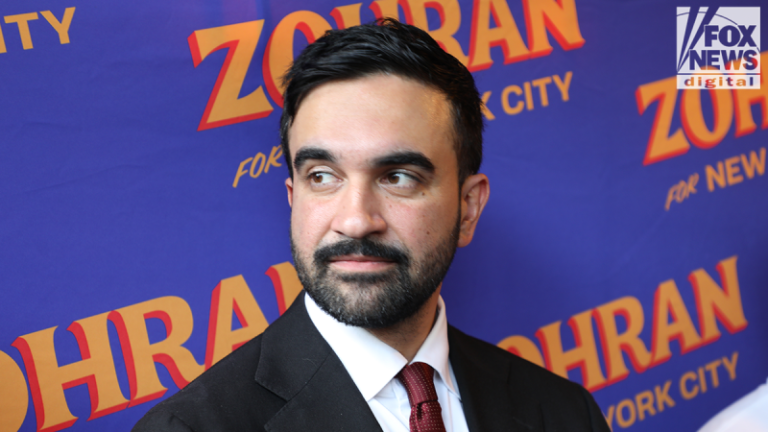President Donald Trump is ordering the aircraft carrier USS Gerald R. Ford to head to the Caribbean as he ramps up his crusade against drugs — marking the first time a carrier has conducted an operational deployment in the region in more than 30 years.
Trump has built up naval assets in the region as attacks against alleged drug boats have increased since September, but sending an aircraft carrier is an unprecedented move. A warship like the Ford hasn’t participated in military operations in the region since 1994, when two carriers were dispatched to respond to political unrest in Haiti for Operation Uphold Democracy, according to U.S. Southern Command’s (SOUTHCOM) records shared with Fox News Digital.
The Ford’s deployment comes as Trump has signaled that Venezuelan President Nicolás Maduro may not be in office much longer. The Trump administration has conducted 15 strikes in the Caribbean, while U.S. lawmakers have raised concerns about their legality and a broader conflict in the region.
During Operation Uphold Democracy, aircraft carriers USS Dwight D. Eisenhower and USS America headed to the region as part of a multinational intervention, after Haitian Lt. Gen. Raoul Cedras led a military coup in 1991 that ousted the island’s first freely elected president, Jean-Bertrand Aristide.
In July 1994, the United Nations passed a resolution authorizing the use of military force to restore democracy in Haiti, paving the way for Operation Uphold Democracy to launch in September 1994 as a military buildup designed to pressure Cedras’ regime to step down, according to the State Department’s Office of the Historian.
At the time, President Bill Clinton justified the intervention, which involved nearly 25,000 U.S. troops, as necessary to remove the Cedras regime after employing ‘every diplomatic avenue possible.’
Clinton said in a radio address Sept. 17, 1994, that the Cedras regime had two options: either leave peacefully or be ousted forcefully.
‘The remaining question is not whether they will leave but how they will leave,’ Clinton said in a radio address Sept. 17, 1994. ‘They can go peacefully and increase the chances for a peaceful future and a more stable future for Haiti in the near term, not only for all those whose democracy they stole but for themselves as well. They can do that, or they will be removed by force.’
In addition to military forces, Clinton also announced that former president Jimmy Carter, former Chairman of the Joint Chiefs of Staff Gen. Colin Powell and Chairman of the Senate Armed Services Committee Sen. Sam Nunn, D-Ga., had departed for Haiti in a final attempt to secure a peaceful transfer of power.
U.S. forces started to arrive in Haiti Sept. 19, 2024, while diplomatic negotiations between the U.S. delegation and Cedras’ regime were underway, ultimately prompting Cedras’ regime to surrender and allowing Aristide to return to power.
Since Operation Uphold Democracy, carriers have sailed through SOUTHCOM’s waters for several exercises and supported humanitarian efforts. For example, the USS George Washington completed exercises in the region as part of the Southern Seas 2024 deployment aimed at facilitating maritime partnerships with allies as part of a homeport change from Norfolk, Virginia, to Yokosuka, Japan.
The carrier participated in these exercises in 2008 and 2015 during homeport changes between the East Coast and Japan. Altogether, there have been a total of 10 Southern Seas missions since 2007, according to SOUTHCOM.
Additionally, the aircraft carrier USS Carl Vinson also assisted with humanitarian relief efforts in 2010 after Haiti suffered a massive earthquake as part of Operation Unified Response, according to Naval History and Heritage Command.
Meanwhile, Trump is ramping up strikes against alleged drug boats in the Caribbean — totaling 15 strikes since the beginning of September — stoking concerns from lawmakers on both sides of the aisle about whether they are legal. For example, Sens. Adam Schiff, D-Calif., Tim Kaine, D-Va., and Rand Paul, R-Ky., introduced a war powers resolution prohibiting U.S. armed forces from engaging in ‘hostilities’ against Venezuela.
‘The Trump administration has made it clear they may launch military action inside Venezuela’s borders and won’t stop at boat strikes in the Caribbean,’ Schiff said in a statement Oct. 17.
However, Sen. Lindsey Graham, R-S.C., said Oct. 26 that the Trump administration has the authority it needs to conduct these strikes, and that Trump has decided its ‘time’ for Maduro to go.
The White House did not respond to a request for comment from Fox News Digital.
The Trump administration repeatedly has stated it does not recognize Maduro as a legitimate head of state, and claims he is instead a leader of a drug cartel. Likewise, the Trump administration increased the reward for information leading to Maduro’s arrest to $50 million in August, claiming he is ‘one of the largest narco-traffickers in the world.’
After the Trump administration announced the Ford would head to SOUTHCOM’s area of operations, Maduro accused Trump of ‘fabricating a new eternal war.’
‘They promised they would never again get involved in a war, and they are fabricating a war,’ Maduro said in a national broadcast on Oct. 24.
Meanwhile, Trump said Sunday in an interview with CBS’ ’60 Minutes’ that although he doesn’t expect a war with Venezuela, he believes Maduro’s days are limited when asked about ordering the carrier to the region.
The Ford may be the Navy’s newest carrier, but it’s already been quick to respond to several significant conflicts since its first full-length deployment in 2023. For example, the Pentagon sent the Ford to the Eastern Mediterranean in October 2023 after Hamas’ initial attack on Israel.
While in the Caribbean, the Ford is expected to conduct strike operations on land, and provide close air support for special operations troops, according to experts.
‘I estimate the FORD will be doing strike operations against narcotics trafficking and manufacturing sites ashore as well as providing close air support to special operations troops,’ Bryan Clark, director of the Hudson Institute think tank’s Center for Defense Concepts and Technology, said in a Monday email to Fox News Digital.
Brent Sadler, a senior fellow for naval warfare and advanced technology at The Heritage Foundation, a conservative think tank in Washington, said that the carrier’s deployment seeks to put additional pressure on Venezuela, so Caracas doesn’t retaliate following the U.S. military strikes in the region.
‘The Ford’s arrival in SOUTHCOM area is not unprecedented but given the ongoing attacks on Cartel boats significant. I see this move as intended to deter Venezuela from escalating the crisis and providing the President extra options should he want to increase the attacks on the Cartels,’ Sadler said in an email to Fox News Digital on Monday. ‘That said, I would anticipate the Ford’s air wing being very active in air surveillance and defense.’










